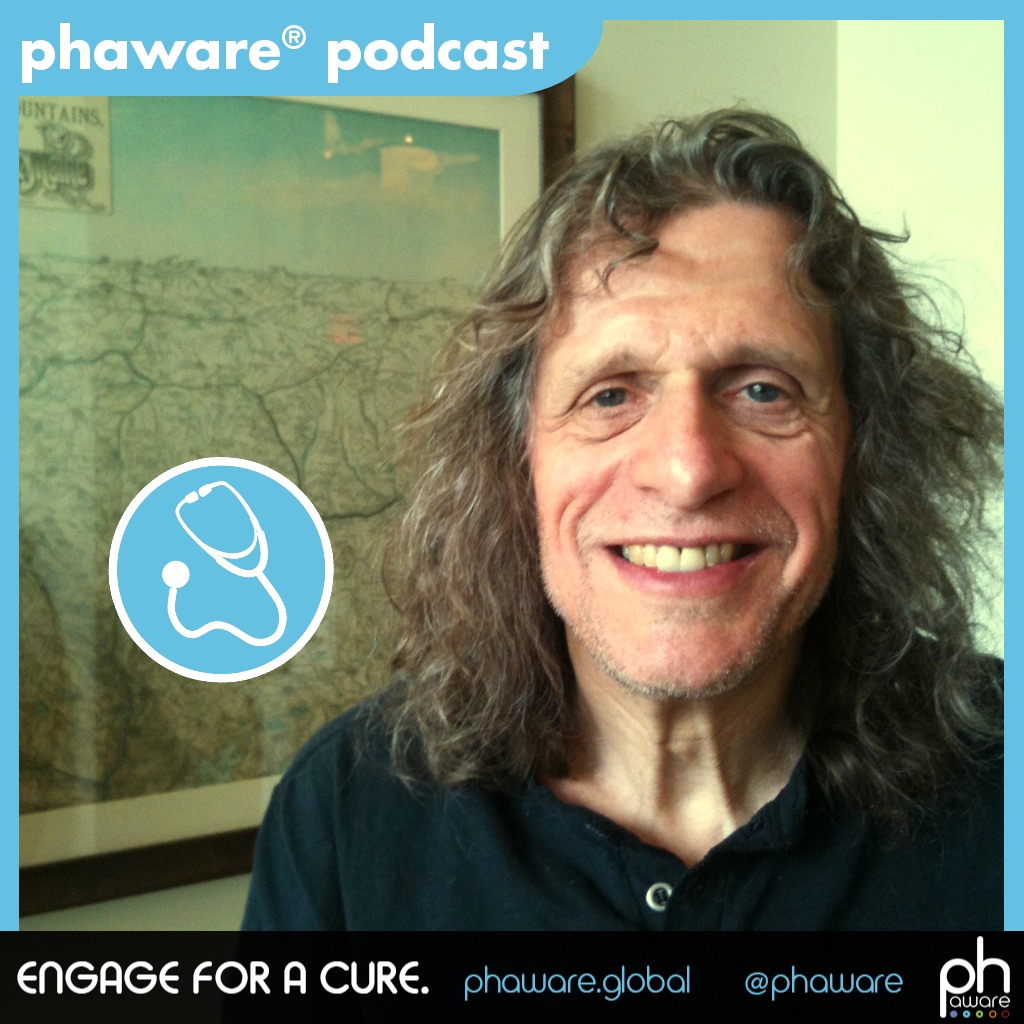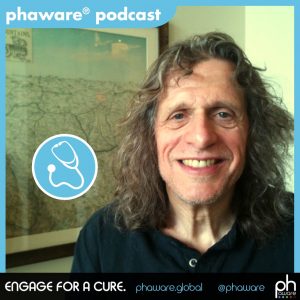Phaware Podcast: Harrison ‘Hap’ Farber, MD (Part 2 of 2)
Written by |

This podcast series, created and produced by phaware, is being offered as a regular guest feature on Pulmonary Hypertension News to bring the voices and life experiences of PH patients, family members, caregivers, healthcare specialists, and others to our readers. You may listen to the podcast directly, or read it via the transcript that runs below.
I’m Aware That I’m Rare: Harrison “Hap” Farber, MD
The phaware® interview (Episode 120)
Harrison “Hap” Farber, MD discusses PAH associated with HIV infection.
Dr. Farber is considered an opinion leader and internationally recognized expert in the field of pulmonary hypertension. He is a professor in the Department of Medicine and attends in the Medical Intensive Care Unit and on the Pulmonary Consultation Service at Boston Medical Center. He also oversees the care of all patients with pulmonary hypertension at Boston Medical Center.
I’m Hap Farber from Boston University School of Medicine at Boston Mass and we’re going to talk a little bit about PAH associated with HIV infection.
And I think this is important for a couple of reasons. One, is it’s probably not well known. It  seems to be like the orphan of PAH, because every study or every randomized controlled trial that has looked at therapies of PAH has used HIV as an exclusion. And so there’s very little experience in randomized controlled trials, almost none. And there’s very little experience otherwise. And it’s often overlooked in part because people with HIV can have so many different reasons to be short of breath that pulmonary hypertension is probably one of the last things that most providers think of. And most infectious disease specialists, who obviously see the bulk of HIV patients, don’t even have this on their radar. That said, we’ll just sort of summarize what’s known about it.
seems to be like the orphan of PAH, because every study or every randomized controlled trial that has looked at therapies of PAH has used HIV as an exclusion. And so there’s very little experience in randomized controlled trials, almost none. And there’s very little experience otherwise. And it’s often overlooked in part because people with HIV can have so many different reasons to be short of breath that pulmonary hypertension is probably one of the last things that most providers think of. And most infectious disease specialists, who obviously see the bulk of HIV patients, don’t even have this on their radar. That said, we’ll just sort of summarize what’s known about it.
So, it was first described in the 1980s. It was originally described in patients who had received transfusions for hemophilia. So, it actually was thought to be related initially to something about the hemophilia or some toxin in the processing of the blood for the hemophiliac, but nobody really knew. So, the first five cases actually in the literature are in hemophiliacs. Then it became clear as this went on that it was not anything to do with hemophilia, that it actually had to do with HIV because it showed up in people who had HIV for any reason, not just hemophilia. IV drug abuse, et cetera, et cetera. Originally mostly in gay males, but now obviously it’s extended to heterosexuals, both males and females. So, it turns out that it’s not as uncommon as people think.
So, there was originally a study from Switzerland looking at IV drug abusers who are HIV positive and incidence of it was about one patient out of every 200, so .5%. And you could argue, “Well, maybe that doesn’t mean anything because that was before the age of effective antiretroviral therapy.” However, the French looked at it subsequently when antiretroviral therapy was available. Granted, not as good as the therapy that’s available now, but the incidence then was .46% so it hadn’t changed.
That’s interesting because the few studies that have looked at it suggest strongly that if you develop PAH from HIV treating it with antiretrovirals has absolutely no effect on the PAH part of it. That said, early on in the literature most people with HIV PAH did exceptionally poorly. In fact, there was a huge percentage of them that died within weeks of being diagnosed. It turns out that it’s probably not because of the lethality of the disease, it’s probably because of the delay in diagnosis and the fact that when the diagnosis was finally made these people were in right heart failure. Newer data, with the therapies that are available, suggest that these people are very responsive and have survivals that are very similar to people with idiopathic disease.
What’s also fascinating about this is that the risk of developing PAH with HIV does not depend on your CD4 count. It does not depend on your viral load. It does not depend on whether you’ve had previous opportunistic infections or not. It seemingly is related to the length of time that you’ve been HIV infected. So, most people who develop this, with rare exceptions, have been infected for six years or longer. Some 10 years or longer. There are a few cases early on, but most of them have been infected for a long time. And the early-on cases may be just people who didn’t know they were HIV positive. They had been HIV positive for a long period of time and now just found out. So that’s sort of interesting.
The other interesting part of it is we have no idea why you get this. There are some theories. The current theories are based on the fact that it probably is a piece of the virus, whether it’s GP120, whether it’s Nef, whatever, that these pieces cause endothelial cells and/or macrophages to become reactive, release more inflammatory markers and sort of growth hormones and stuff like that. So, it’s really not known. There has not been, quite honestly, a lot of literature investigating the mechanism because there really hasn’t been a lot of literature looking at HIV PAH.
But if you think about it, just in terms of numbers, the number is potentially unbelievable because let’s assume it’s one in 200 people who are at risk. So, in the U.S. currently there are about a million people-plus who know that they are HIV infected. There are at least the same number who don’t know that they’re HIV infected. So that’s a couple million people. That’s not insignificant, but worldwide there’s 35 to 40 million people with HIV. Assuming that they lived six-plus years, which nowadays is really the reality rather than the rarity. Nowadays with the antiretrovirals that are available, the median survival of an HIV positive individual if you take your meds is about 21 years. That would suggest that there’s an enormous population at risk.
Now, you could easily argue that most of these people will never be seen and that probably is true, because the largest patient populations of people at risk are in places where they’re never going to get healthcare. So they’re never going to get an echo, they’re never going to get a right heart catheterization, they’re probably never going to get picked up. However, in the U.S. or western Europe that’s not the case. So it probably is much more prevalent than we think. We’re actually part of a study or we are doing a study to look at prevalence in the U.S. And the early data, granted mostly with echo, but now becoming more and more right-heart catheterization, suggest that it’s much higher than that.
Now, people will say that they haven’t seen this in a long time. And I think that may be true. I think the most likely scenario where you’re at risk is if you are HIV positive and/or Hep C positive with it and/or have been or are an active IV drug abuser. I think if you put the three together, which is what we see where I work, that’s like the perfect storm to develop PAH from HIV. If you have one of them or two of them it’s probably less, but it probably still does occur but at a lower rate.
So what we tell our ID people [infectious disease physicians] in and around Boston is if you have somebody who complains of being short of breath and you can’t find any other reason for them to be short of breath, start thinking about PAH. And when you actually start thinking about it and look, it is more common than you think. So, I would sort of emphasize to anybody listening to this, who does take care of HIV patients, that it is an entity, it’s out there, it’s considered group one PAH, it’s one of the APAH entities and don’t forget about it.
I’m Hep Farber and I’m really aware that I’m sort of rare.
EVERYBODY HAS A STORY. WHAT’S YOURS?
Phaware global association wants to share your pulmonary hypertension story with their engaged global audience. Whether you are a patient, caregiver, or medical professional, they are enlisting PH community members from around the world. Visit www.phawarepodcast.libsyn.com/contact to share your story and to be considered for a future episode. Never miss an episode with the phaware® podcast app. Learn more about pulmonary hypertension at www.phaware.global. #phaware
Note: Pulmonary Hypertension News is strictly a news and information website about the disease. It does not provide medical advice, diagnosis, or treatment. This content is not intended to be a substitute for professional medical advice, diagnosis, or treatment. Always seek the advice of your physician or other qualified health provider with any questions you may have regarding a medical condition. Never disregard professional medical advice or delay in seeking it because of something you have read on this website. The opinions expressed in this column are not those of Pulmonary Hypertension News or its parent company, Bionews Services, and are intended to spark discussion about issues pertaining to pulmonary hypertension.






Leave a comment
Fill in the required fields to post. Your email address will not be published.